Uncovering the Truth: Can Bed Bugs Bite Through Clothes?
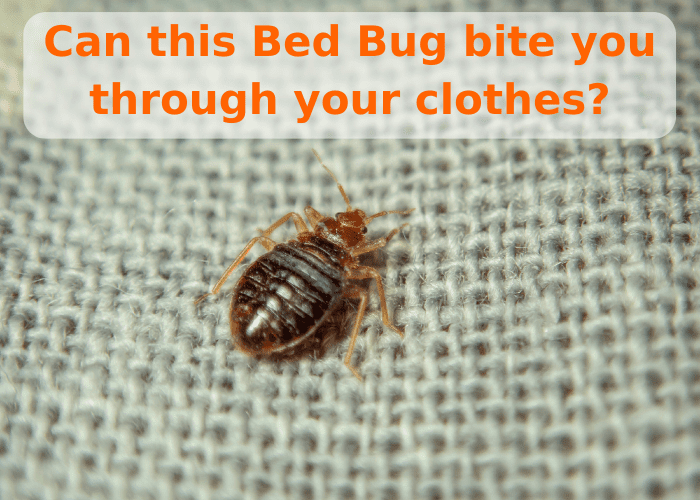
You’ve probably heard all sorts of advice – “Use this spray,” “Never do that,” or “Bed bugs can’t possibly do this.” Here, we’re taking a different approach—sharing proven knowledge and strategies based on professional expertise and successful real-life experiences, cutting through the noise and confusion. Today, we delve into one of the most unsettling questions: Can bed bugs bite through clothes?
Table of Contents
OPEN/CLOSE TABLE OF CONTENTS
If you’re tempted to start wrapping your bed in plastic and using a tarp for a sheet…well, how about you just click that button below instead? Yeah, that seems like a much better option.
The Bed Bug Basics: Understanding their Behaviors
Before we get into the meat of the matter, it’s crucial to understand bed bug behaviors.
Lifecycle and Feeding Habits of Bed Bugs
Bed bugs are tiny insects that feed solely on the blood of humans and other warm-blooded animals. Their lifecycle comprises five nymph stages and an adult stage, all of which—except the just-hatched first instar nymphs—require a blood meal.
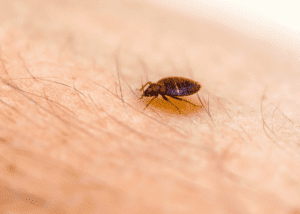
Bed Bugs: Nocturnal Bloodsuckers and Their Preference for Bare Skin
Bed bugs are nocturnal creatures. They’re most active at night when their human hosts are asleep. Given their blood-sucking nature, they prefer easily accessible, exposed skin. However, this doesn’t answer the question at hand. What if there’s no exposed skin? Will they bite through clothes?
Can Bed Bugs Bite Through Clothes: The Answer
The Nature of Bed Bug Bites: Can They Penetrate Fabric?
Here comes the big reveal. Generally, bed bugs do not bite through clothing. Their biting mechanism is not designed to navigate through fabric. Bed bugs use a stylet fascicle, a structure with two tubes, to pierce the skin and feed. One tube injects saliva that numbs the skin and prevents blood from clotting, while the other draws blood. This is significantly different from, say, a mosquito’s proboscis that is adapted to pierce through materials, including clothing.
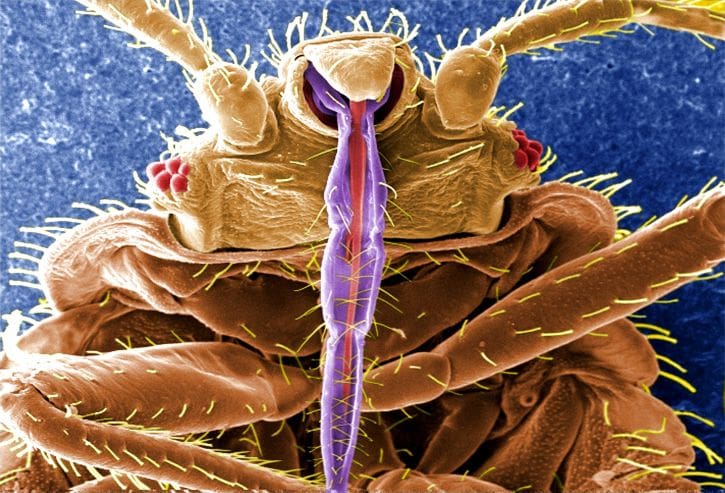
Photo by Janice Haney Carr, USCDCP on Pixnio
Factors Influencing Bed Bug Bites: Clothing Material and Thickness
However, thin, loose garments might not be much of a deterrent. If the fabric is thin enough, they might be able to reach the skin underneath. Picture a bed bug creeping up on you while you’re lost in your dreams, navigating the hills and valleys of your pajama’s folds.
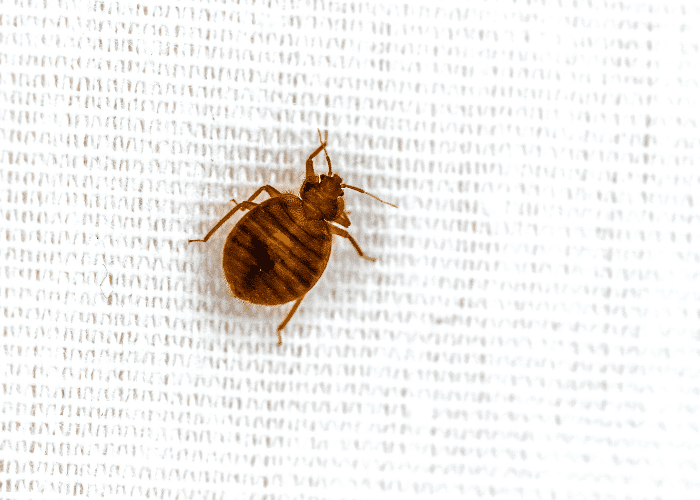
The type of fabric also matters. Bed bugs may find it harder to navigate through synthetic fabrics as compared to natural ones. So, your cotton pajamas might not offer much protection, but your polyester ones might stand a better chance. Also, bed bugs are more likely to crawl under clothing rather than attempting to bite through it.
Protective Measures: What Kind of Clothing Can Deter Bed Bugs?
Long, thick clothing that covers most of the skin can provide some protection against bed bug bites. Light-colored clothing makes it easier to spot them.
Spotting a Bed Bug Infestation: Signs and Symptoms
Recognizing an infestation is the first step towards dealing with bed bugs.
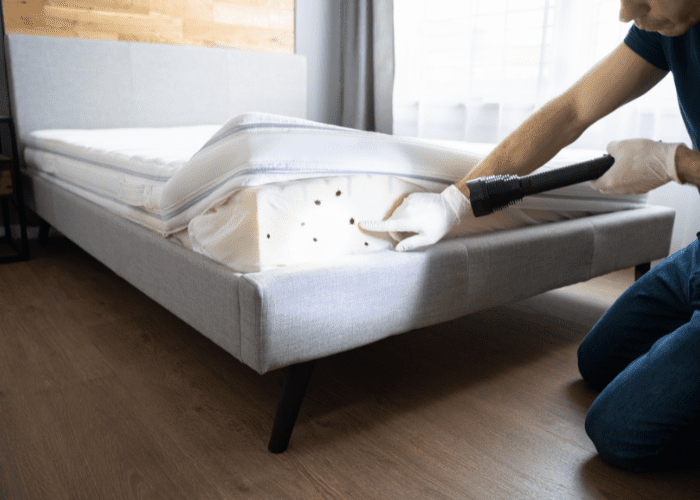
Distinguishing Bed Bug Bites: From Itchy Welts to Bite Marks
Typically, bed bug bites manifest as small, red welts that are itchy. They often occur in a line or cluster. Bites alone, however, can be hard to distinguish from other insect bites.
Other Telltale Signs of an Infestation
Signs of an infestation include dark spots on bedding (bed bug excrement), shed skins, and in severe cases, a sweet, musty odor.
Comparing Bed Bug Bites with Other Insect Bites
Not all insect bites are alike. Understanding the differences is crucial in identifying the culprit.
Bed Bug Bites vs. Mosquito Bites: Understanding the Differences
While mosquito bites are usually sporadic and localized to exposed areas, bed bug bites tend to occur in a line or cluster, and can appear anywhere on the body.
Recognizing Bed Bug Bites Among Various Insect Bites
The key to recognizing bed bug bites lies in their pattern and the accompanying signs of an infestation.
Preventing Bed Bugs: Key Strategies
Prevention is always better than cure, particularly with bed bugs.
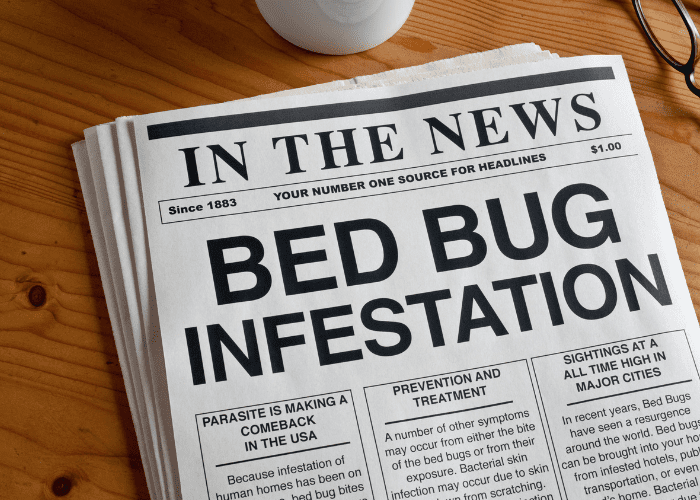
Effective Home Hygiene Practices to Ward Off Bed Bugs
Regular cleaning, reducing clutter, and sealing off potential entry points can help prevent an infestation.

Treating Bed Bug Bites: Practical Solutions
If you’ve been bitten, here’s what you can do.
Home Remedies for Soothing Itchy Welts
Over-the-counter creams, antihistamines, and home remedies like aloe vera gel can help soothe the itchiness.
When to Seek Medical Attention for Bed Bug Bites
While bed bug bites usually aren’t dangerous, you should seek medical attention if you experience severe allergic reactions, skin infections from scratching, or if you’re feeling overly anxious or insomnia.
Dealing with a Bed Bug Infestation: Step-by-Step Guide
If you have an infestation, it’s essential to take immediate action.
DIY Pest Control Methods: Do They Work?
While DIY methods can help in mild infestations, they often fall short in severe cases. Professional pest control is recommended.
Calling in the Professionals: When and Why?
Professional pest control services are equipped with the tools and knowledge to effectively eradicate bed bug infestations. They should be called in if DIY methods fail or if the infestation is severe.
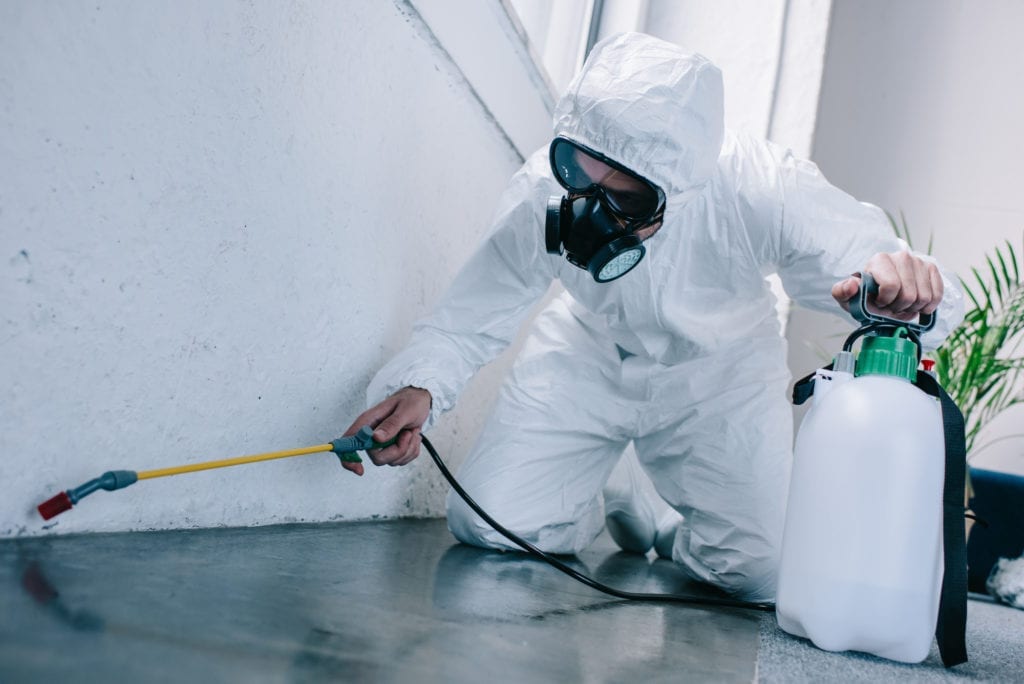
Frequently Asked Questions
Here are answers to some of the most common questions people have about bed bugs.
Can bed bugs bite through clothes?
Generally, bed bugs do not bite through clothing. Their biting mechanism is not designed to navigate through fabric. Bed bugs use a stylet fascicle, a structure with two tubes, to pierce the skin and feed. One tube injects saliva that numbs the skin and prevents blood from clotting, while the other draws blood. This is significantly different from, say, a mosquito’s proboscis that is adapted to pierce through materials, including clothing.
FAQ 2: Why are bed bugs so hard to get rid of?
Bed bugs are notoriously difficult to eradicate because of their small size, rapid reproduction, and their ability to survive up to a year without feeding. They can hide in tiny cracks and crevices near the bed and venture out only to feed, making them difficult to spot. Furthermore, their eggs are resistant to many forms of treatment, so a single round of treatment is often not enough.
FAQ 3: Are there effective home remedies for bed bug bites?
Yes, there are several home remedies that can help soothe the itchiness and discomfort caused by bed bug bites. Applying something cool, like a clean, damp cloth, on the affected area can help with the itching. Aloe vera gel and lemon juice, known for their anti-inflammatory and antibacterial properties, can also provide relief. Over-the-counter antihistamines can help if the itchiness is severe. Remember, everyone’s skin reacts differently, and these remedies might not work for everyone.
FAQ 4: How can I prevent a bed bug infestation?
Preventing a bed bug infestation involves a few key steps. Regularly inspect your home, particularly the bedrooms and sleeping areas, for signs of bed bugs. When traveling, inspect hotel rooms before settling in, and keep your luggage off the floor. After traveling, wash and dry all clothing on high heat to kill any bed bugs. Finally, if you purchase second-hand furniture, make sure to thoroughly inspect it for bed bugs before bringing it into your home.
FAQ 5: How can I distinguish bed bug bites from other insect bites?
Bed bug bites are often confused with other insect bites, such as those from mosquitoes or fleas. However, there are some characteristics that can help you distinguish them. Bed bug bites often appear as small, red welts and they tend to occur in a line or cluster, rather than sporadically. Also, bed bug bites can appear anywhere on the body, unlike mosquito bites which are usually localized to exposed areas.
FAQ 6: When should I call a professional pest control service for a bed bug infestation?
If DIY methods fail to eradicate the bed bugs, or if the infestation is severe, you should call a professional pest control service. Severe infestations are harder to treat and require specialized tools and knowledge. If you are seeing bed bugs during the day, noticing a sweet, musty odor, or finding bed bugs in multiple rooms, these are signs of a severe infestation, and you should call a professional.
In conclusion, understanding bed bugs and their behaviors is the first step in dealing with them. Whether it’s preventing an infestation or treating bites, knowledge is your best weapon.
Leave a Reply